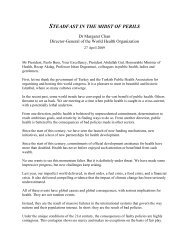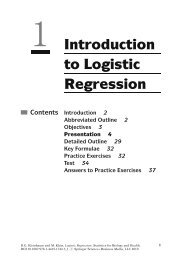The Evolution of HTA in Emerging Markets Health-Care ... - TREE
The Evolution of HTA in Emerging Markets Health-Care ... - TREE
The Evolution of HTA in Emerging Markets Health-Care ... - TREE
Create successful ePaper yourself
Turn your PDF publications into a flip-book with our unique Google optimized e-Paper software.
OHE Consult<strong>in</strong>g Report for PhRMA<br />
5 January 2011<br />
<br />
In Brazil, the CITEC works slowly and appears to be under-‐resourced. This has the effect,<br />
<strong>in</strong>tentional or otherwise, or delay<strong>in</strong>g reviews <strong>of</strong>, and decisions on, access to new technologies.<br />
<strong>The</strong>re are aspects <strong>of</strong> the <strong>HTA</strong> process that could be improved, notably around transparency <strong>of</strong><br />
process and <strong>of</strong> selection criteria. However, it is also unclear how the role <strong>of</strong> CITEC fits alongside a<br />
constitutional right <strong>of</strong> access to healthcare (which is clearly not consistent with the levels <strong>of</strong><br />
fund<strong>in</strong>g available) and regulation by the ANS <strong>of</strong> the m<strong>in</strong>imum requirements <strong>of</strong> the private<br />
<strong>in</strong>surance package. If emerg<strong>in</strong>g markets allow market<strong>in</strong>g authorisation, their citizens will have<br />
expectations <strong>of</strong> access. <strong>The</strong> situation <strong>in</strong> Brazil exemplifies this, as once products are approved<br />
for market<strong>in</strong>g authorisation and a price is set via external reference pric<strong>in</strong>g rules, then citizens<br />
can sue for access even though the public system has not yet approved the product for use <strong>in</strong><br />
the public plan.<br />
<br />
In Taiwan, the role <strong>of</strong> <strong>HTA</strong> appears to be exclusively <strong>in</strong> the area <strong>of</strong> drug reimbursement, and here<br />
it is unclear how it fits logically alongside an <strong>in</strong>ternational reference price system. In theory,<br />
drugs show<strong>in</strong>g <strong>in</strong>cremental value can get higher prices with<strong>in</strong> the range <strong>of</strong> reference price<br />
comparisons. <strong>The</strong>re are also some issues around process such as the degree <strong>of</strong> transparency <strong>of</strong><br />
the assessment and the relationship between the assessment and the drug licens<strong>in</strong>g process.<br />
Our understand<strong>in</strong>g is that expertise for the conduct <strong>of</strong> pharmacoeconomic assessments is drawn<br />
from the licens<strong>in</strong>g body but used separately. However, this arrangement clearly causes concern<br />
for the <strong>in</strong>dustry that assessments <strong>of</strong> safety and efficacy may be conflated <strong>in</strong> some way with<br />
assessments <strong>of</strong> relative effectiveness and cost-‐effectiveness.<br />
9.3 An <strong>in</strong>dustry perspective on <strong>HTA</strong>: IFPMA, PhRMA and EFPIA Pr<strong>in</strong>ciples<br />
In order to help put <strong>HTA</strong> developments <strong>in</strong> the context <strong>of</strong> <strong>in</strong>dustry th<strong>in</strong>k<strong>in</strong>g, we reviewed the<br />
follow<strong>in</strong>g published <strong>in</strong>dustry statements on <strong>HTA</strong>:<br />
<br />
<br />
<br />
PhRMA’s <strong>Health</strong> Outcomes Pr<strong>in</strong>ciples and also its Pr<strong>in</strong>ciples for Use <strong>of</strong> Evidence-‐Based<br />
Medic<strong>in</strong>e: Advanc<strong>in</strong>g Patient <strong>Care</strong> and <strong>Health</strong> <strong>Care</strong> Value;<br />
EFPIA’s <strong>The</strong> Use <strong>of</strong> <strong>Health</strong> Technology Assessments (<strong>HTA</strong>) to Evaluate Medic<strong>in</strong>es. Key<br />
Pr<strong>in</strong>ciples<br />
IFPMA’s Position Statement. <strong>Health</strong> Technology Assessment and the Value <strong>of</strong> Medic<strong>in</strong>es.<br />
<strong>The</strong>re is a substantial amount <strong>of</strong> overlap among the statements, as would be expected. <strong>The</strong> key<br />
po<strong>in</strong>ts that stand out and are <strong>of</strong> concern for <strong>in</strong>dustry are as follows:<br />
1. <strong>HTA</strong> should not just be applied to medic<strong>in</strong>es but to all health technologies and <strong>in</strong>terventions.<br />
It should be undertaken as part <strong>of</strong> a broad agenda to improve health care quality and<br />
efficiency, rather than used as a cost conta<strong>in</strong>ment tool. Likewise “silo budget<strong>in</strong>g,” where<br />
medic<strong>in</strong>es are put <strong>in</strong>to a separate cost bucket, runs counter to optimis<strong>in</strong>g health ga<strong>in</strong>s across<br />
the system;<br />
2. A broad perspective <strong>of</strong> value should be used <strong>in</strong>clud<strong>in</strong>g the impact on productivity, and on<br />
caregivers and personal time, and societal health priorities, for example <strong>in</strong> terms <strong>of</strong> disease<br />
burden, should be recognised.<br />
3. <strong>HTA</strong> when applied to determ<strong>in</strong>e access to or reimbursement for pharmaceuticals should be<br />
kept separate from market<strong>in</strong>g authorisation.<br />
64








